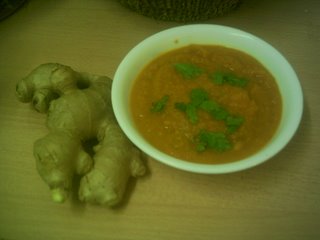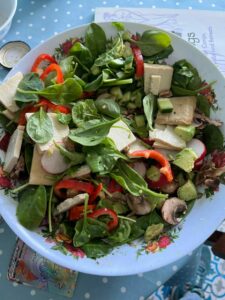Apparently, it’s carrot season at Chubeza. We get lots and lots of wonderful, intense orange carrots every week. They come with the leaves (and we already know what to do with those). I think all this carrot consumption may have actually affected my eyesight; my optometrist reports that my prescription has gone down. Whether it’s due to the carrot or not, I have no idea; but the fact is that carrots pack an enormous amount of vitamin A, in the form of beta-carotene, which is said to improve night vision. Carrots also contain a variety of anti-cancer agents, and are also useful for preventing and treating lung inflammation.
In Chinese medicine, carrots are associated with the earth element, and beneficial for the spleen – which means, in Western anatomy, that they assist digestion as well as muscular issues.
And what better way to cook lots of carrots than a day when one’s loved one falls sick? Chad’s immune system, alas, leaves much to be desired, and he really feels awful today. His throat hurts, his sinuses hurt, his nose is leaking – and he feels drowsy and says extremely funny things. I don’t think he means to say them. They come out funny because of the fever.
Warming food is good for situations such as this, and the carrot pairs well with ginger to create an old favorite – carrot ginger soup. This version doesn’t have any cream, which, in Chinese medicine, increases dampness in the body (and we have plenty of that here, thank you very much). It does, however, have browned onions and garlic, and some fun Middle Eastern spices. Naturally, it can be made with the addition of potatoes, yams, or squash, if you so desire; our decision to be carrot purists today stems from the dry fact that we already had potatoes today, and that yams were not in this week’s box. I hope you enjoy the soup, and post your own versions of this favorite, if you like.
Middle Eastern Carrot Ginger Soup
10 nice organic carrots
a 3” or 4” chunk of ginger
1 very large onion
half a garlic bulb
1 tsp of the following: curcum, cumin, nutmeg, cinnamon (yes, trust me on this).
2 quarts of water or vegetable broth (you could make the broth out of the carrot leaves, thus using the entire vegetable and not letting nice leaves go to waste).
We start the way my grandmother started many of her culinary marvels: we peel and slice each garlic clove (this can help with the peeling, and believe me, it really works), we slice the onion into rings, we splash the bottom of a large pot with good olive oil, and we fry the onions and garlic. No “sauteeing” here. The stuff needs to be brown and fragrant. When it is, and there’s a lovely smell in the kitchen, we pour some broth or water into the pan and start deglazing. This may seem silly or unnecessary, but it improves the taste of the soup to no end. Scrape the brown stuff in the bottom of the pot, using a wooden spoon. It’ll be very good with the broth.
When you’re done scraping, add the rest of the liquid, and the carrots, and the ginger, and the spices, and let cook for about 30 minutes. Then, we do the following nifty thing: using a straining spoon, we go fishing. That’s right. We fish out all the carrots and ginger, and stick them in the blender, with a bit of the broth. We puree the carrots and ginger, and return them to the pot, mixing the puree with the broth. Now, we just sprinkle a bit of parsley on top, and we’re done. I hope Chad enjoys it and feels well!




2 Comments
After having tried just about every garlic-processing utensil in the known universe, I have settled upon the flat side of a knife as the ultimate in getting the garlic to moult.
Sometimes I cut off the rough ends and make a slit through the side of the skin, but generally it’s chunk-thump-chop with the side of the knife… …for the simple reason that I like touching it more than the plastic thingies let me…
I’ve always been a garlic fondler, I’m afraid.
I hear ya; fondling garlic is not a bad experience.The good thing with the little plastic thingy is that it saves you from having garlic peel stuck in your fingernails (which happens to me quite often when I go for the cut-off-rough-ends-and-slit method).